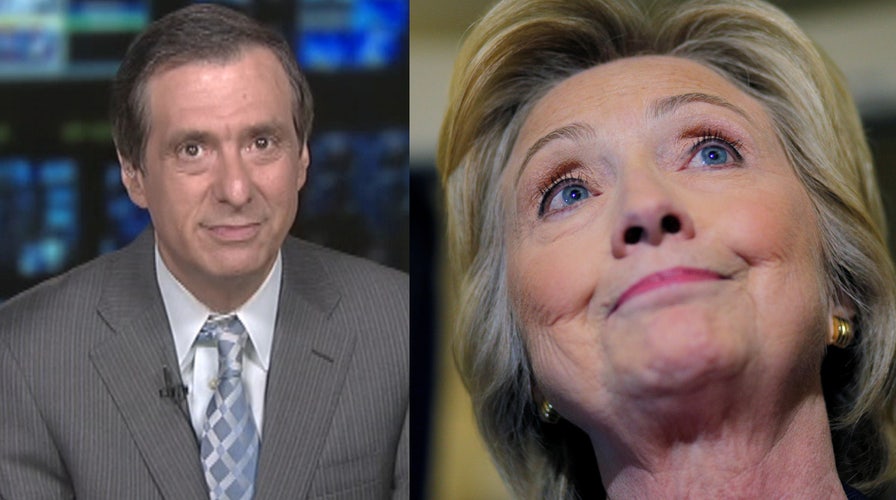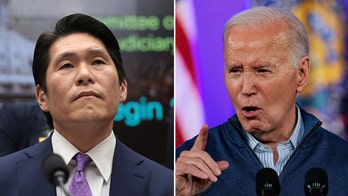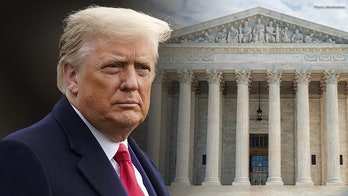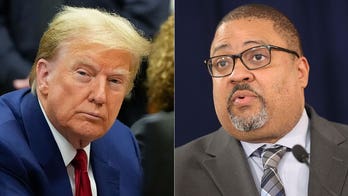Kurtz: Is Clinton mainly about demonizing Trump?
'MediaBuzz' host Howard Kurtz asks, why isn't Hillary Clinton really running away with the election like so many pundit would like you to believe?
Many pundits who figured Hillary Clinton had this thing wrapped up are trying to solve what they see as a puzzle: Why isn’t she clobbering Donald Trump?
Despite her many weaknesses, their view is that Trump is so unpopular and divisive and has turned off so many key voting groups that Hillary ought to waltz back to the mansion she once shared with Bill.
But tightening poll numbers are forcing them to take a harder look at the Democratic presidential nominee.
Sure, we’ve known all along that it’s rare for the party that holds the White House for two terms to win a third one—although these days the Dems have a built-in Electoral College advantage. We’ve known that Clinton isn’t a great retail politician and that she’s an establishment candidate in a non-establishment year. We’ve known that she has abysmally low ratings on honesty and trustworthiness, exacerbated by the email and Clinton Foundation mess.
But is there more to it?
Doesn’t she have to be more than the anti-Trump? Especially now that The Donald is stabilizing his campaign, with more scripted speeches like the one yesterday on military readiness?
Glenn Thrush, a Politico writer who has covered Clinton since her Senate campaigns, sees a certain self-destructive quality:
“No one — not the bullpen of the New York Mets, not the French army, not Wile E. Coyote, not even Al Gore — is better at squandering a commanding lead than the Queen of Coasting, Hillary Rodham Clinton. And nobody is better at handing her adversaries talking points to undermine trust, on emails, on the Clinton Foundation, on her own refusal to do something as simple as talking to the reporters who cover her every day.”
Thrush says it was a bad idea for Clinton to make her campaign “exclusively” about Trump. (Her team would undoubtedly challenge this.) With Clinton essentially running for Barack Obama’s third term, “the electorate is restless and wants change, and no candidate is less equipped by virtue of history, temperament or the tenor of the times to take advantage of that sentiment than Clinton. In fact, the only reason she commands a natural advantage (apart from her party’s innate grip on the Electoral College) is the fact that she is running against Mr. Unacceptable, and is marginally less detested.”
And, the piece says, “the problem, and it has dogged Clinton since she first ran for office in 2000, is that she’s lousy at self-definition, doesn’t like to make the campaign about her (not one of Trump’s problems) and reveals herself only in jagged broken-mirror shards, not a portrait in full for voters to warm themselves by.”
Ross Douthat, the conservative New York Times columnist, is more resigned to a Clinton restoration. If not for Trump’s media domination, he says, “the big story of this election would be the sheer shambolic strangeness of Hillary Clinton’s presidential campaign.
“Her press-ducking, donor-massaging, risk-averse, joyless slog to November feels less like an old-fashioned front porch campaign than a campaign conducted from a corner mansion’s upstairs window.”
But for a Republican Party looking to rebuild, he says, “she would lack many of the qualities that make imperial presidents particularly dangerous — powerful charisma, a passionate and devoted base, a close relationship with a compliant press, a claim on some sort of sweeping policy mandate.”
And here’s National Review Editor Rich Lowry, an ardent Trump critic,
“She is happy to have the race all about her opponent, rather than herself. She avoids press conferences, although she has taken to visiting reporters at the back of her campaign plane for some questions. She hasn’t said anything truly memorable that isn’t a gaffe. Her best moment of the campaign, the Democratic convention, featured vivid performances by nearly everyone in her party except her.
“But Hillary herself lacks almost all the qualities that make for a compelling presidential candidate. She isn’t fresh. She has been prominent in our politics, and controversial, for 25 years. She isn’t entertaining or inspiring. Her speeches never achieve rhetorical liftoff, and she has the most insincere laugh in American politics. She isn’t associated with a cause. In the Democratic primaries, she bent to the energy of the Bernie Sanders phenomenon, and in the general election, she has found her voice only when attacking Donald Trump. She isn’t ethical.”
Lowry’s damning-with-faint-praise takeaway:
“She may be boring, unlikable, and untrustworthy, but she is stolid.”
A more sympathetic columnist, the Washington Post’s David Ignatius, concedes a lack of authenticity:
“In a year when anti-elitism has been a dominant theme in both parties, donning this establishment mantle might appear to be a mistake for Clinton. But let’s be honest: Her strength is that she’s the voice of experienced, centrist leadership. She’s not a convincing populist: The more she tries to sound like one, the more she risks coming off as a phony in the final two months of the campaign.”
Clinton and her team are undoubtedly aware of her weaknesses, given that she lost the 2008 nomination she seemed certain to win. She has not only made stopping Trump the focus of her campaign, she has sometimes refrained from making news while Trump is embroiled in one of his controversies.
But in the end, doesn’t a potential president have to convince at least a good chunk of voters to cast their ballots for her?





